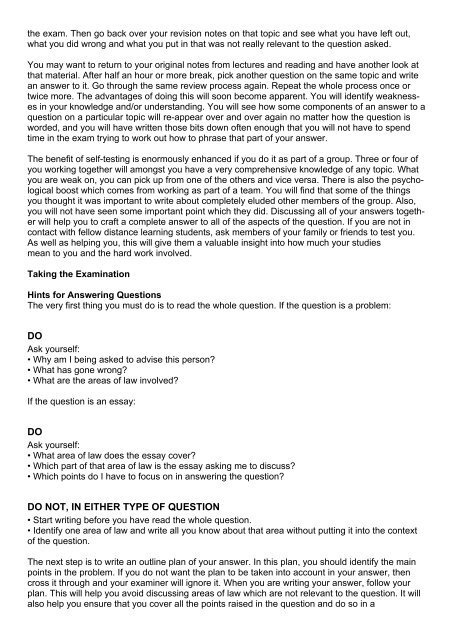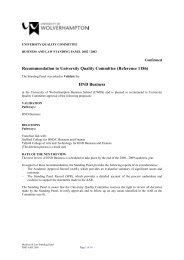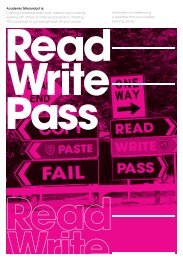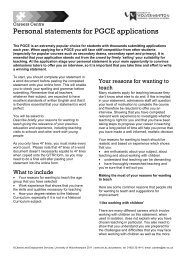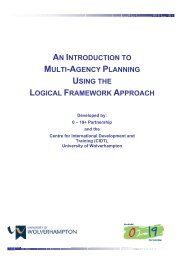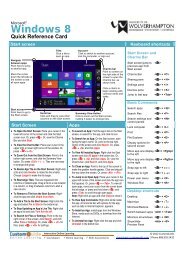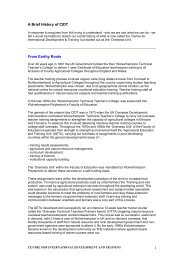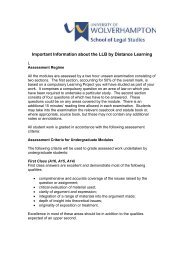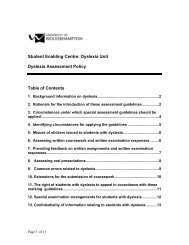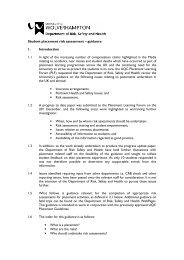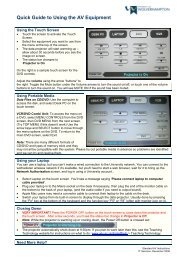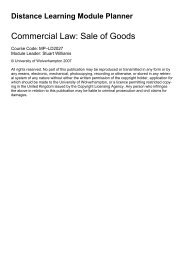Company Law 1 - University of Wolverhampton
Company Law 1 - University of Wolverhampton
Company Law 1 - University of Wolverhampton
- No tags were found...
Create successful ePaper yourself
Turn your PDF publications into a flip-book with our unique Google optimized e-Paper software.
the exam. Then go back over your revision notes on that topic and see what you have left out,what you did wrong and what you put in that was not really relevant to the question asked.You may want to return to your original notes from lectures and reading and have another look atthat material. After half an hour or more break, pick another question on the same topic and writean answer to it. Go through the same review process again. Repeat the whole process once ortwice more. The advantages <strong>of</strong> doing this will soon become apparent. You will identify weaknessesin your knowledge and/or understanding. You will see how some components <strong>of</strong> an answer to aquestion on a particular topic will re-appear over and over again no matter how the question isworded, and you will have written those bits down <strong>of</strong>ten enough that you will not have to spendtime in the exam trying to work out how to phrase that part <strong>of</strong> your answer.The benefit <strong>of</strong> self-testing is enormously enhanced if you do it as part <strong>of</strong> a group. Three or four <strong>of</strong>you working together will amongst you have a very comprehensive knowledge <strong>of</strong> any topic. Whatyou are weak on, you can pick up from one <strong>of</strong> the others and vice versa. There is also the psychologicalboost which comes from working as part <strong>of</strong> a team. You will find that some <strong>of</strong> the thingsyou thought it was important to write about completely eluded other members <strong>of</strong> the group. Also,you will not have seen some important point which they did. Discussing all <strong>of</strong> your answers togetherwill help you to craft a complete answer to all <strong>of</strong> the aspects <strong>of</strong> the question. If you are not incontact with fellow distance learning students, ask members <strong>of</strong> your family or friends to test you.As well as helping you, this will give them a valuable insight into how much your studiesmean to you and the hard work involved.Taking the ExaminationHints for Answering QuestionsThe very first thing you must do is to read the whole question. If the question is a problem:DOAsk yourself:• Why am I being asked to advise this person?• What has gone wrong?• What are the areas <strong>of</strong> law involved?If the question is an essay:DOAsk yourself:• What area <strong>of</strong> law does the essay cover?• Which part <strong>of</strong> that area <strong>of</strong> law is the essay asking me to discuss?• Which points do I have to focus on in answering the question?DO NOT, IN EITHER TYPE OF QUESTION• Start writing before you have read the whole question.• Identify one area <strong>of</strong> law and write all you know about that area without putting it into the context<strong>of</strong> the question.The next step is to write an outline plan <strong>of</strong> your answer. In this plan, you should identify the mainpoints in the problem. If you do not want the plan to be taken into account in your answer, thencross it through and your examiner will ignore it. When you are writing your answer, follow yourplan. This will help you avoid discussing areas <strong>of</strong> law which are not relevant to the question. It willalso help you ensure that you cover all the points raised in the question and do so in a


